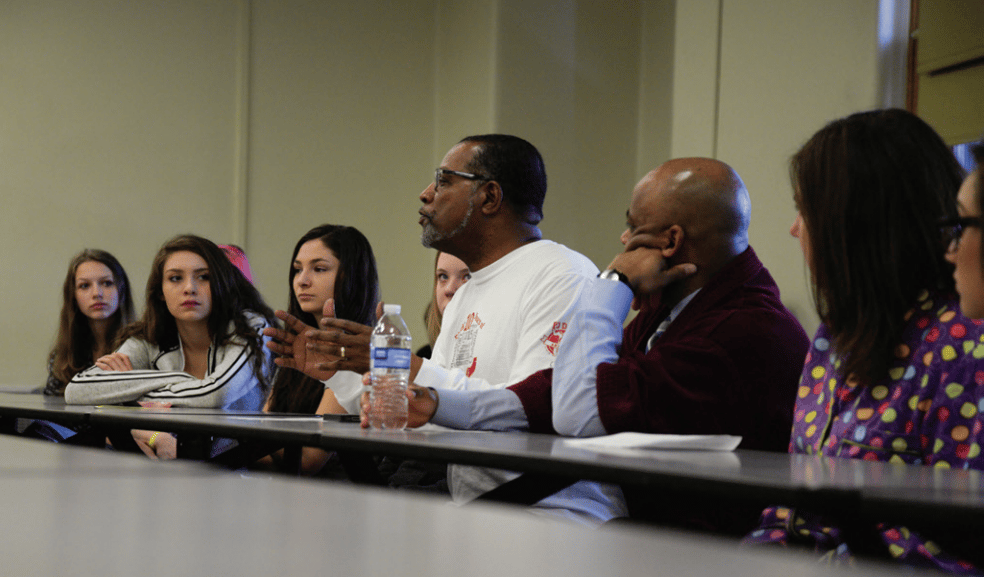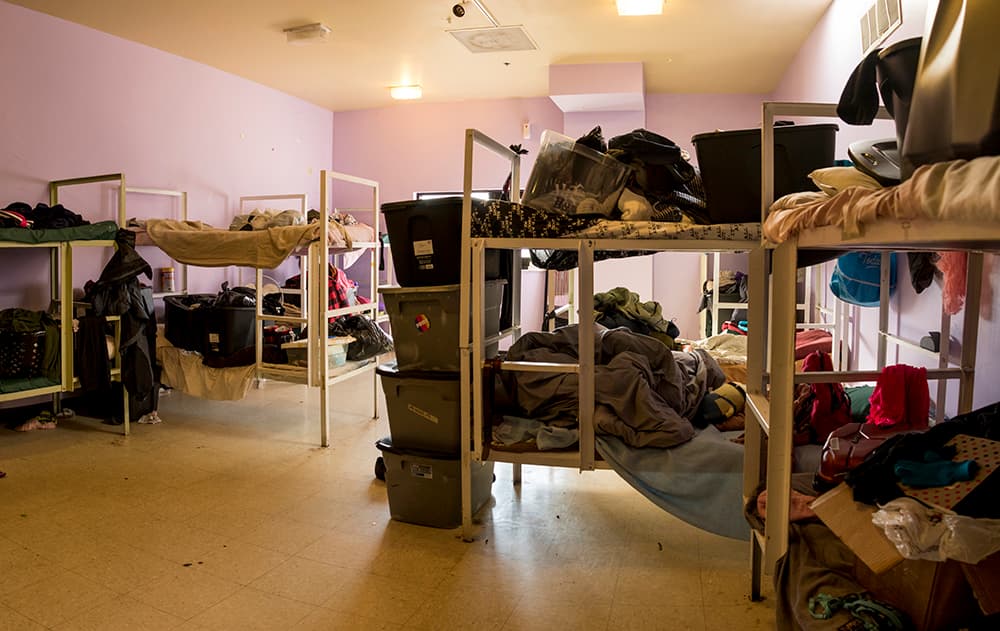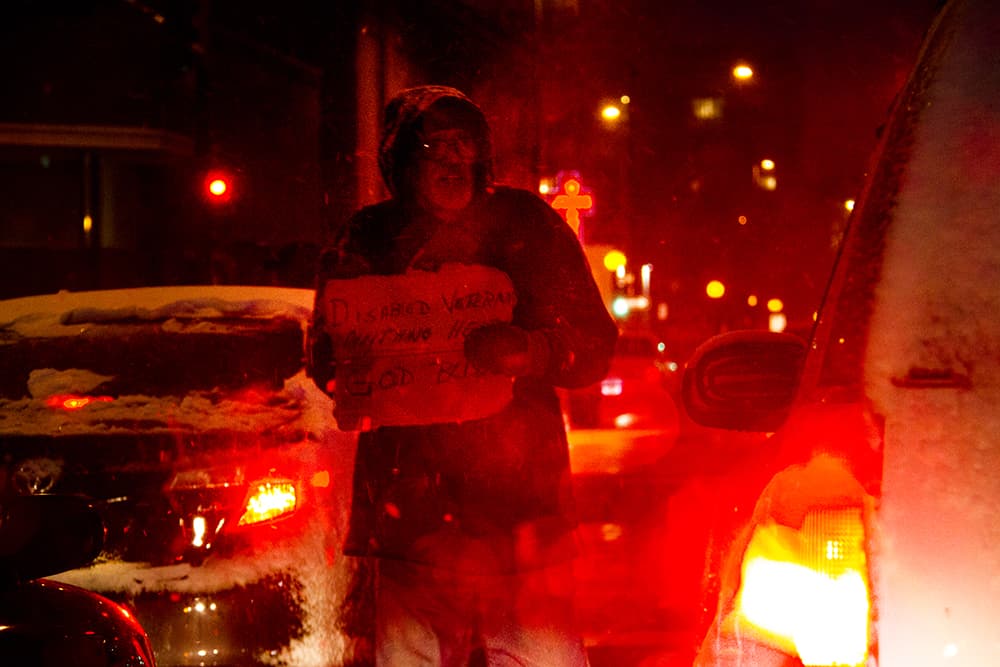Denver’s Road Home, the city’s principal homelessness agency, is in the middle of a dramatic change. Following years of criticism, the city government is pushing to improve conditions at the shelters where hundreds of men and women stay each night.
Some of the signs are obvious, like the hundreds of beds rolling into new private and public shelters. Some of the change is more subtle: Mayor Michael Hancock has moved Bennie Milliner, a longtime ally who led the homelessness agency for five years, to a brand new job in a different department.
Milliner leaves a mixed legacy at Denver’s Road Home, where two nonprofit executives described him as rude and dismissive and others said he lacked the experience to quickly respond to the city’s growing housing crisis, though some praised his service and credited him for the effort now underway. The change comes a year after Denver Fire Department discovered dangerous overcrowding at a large Salvation Army shelter, a situation that could have resulted in mass casualties if a fire had occurred.
“If you put a person for political reasons instead of operational experience, this is what happens,” said Councilman Wayne New. “(Milliner is) a good guy, a nice guy. I can’t blame him if he didn’t have the resources to do it. But he should have been the advocate.”
Milliner now is the first-ever director of community engagement at the Denver Sheriff Department, a job created by Hancock this fall. The mayor's office described it as a way to make new use of Milliner's skills.
With the executive's exit from Road Home, nonprofit leaders and homeless advocates are reassessing the field and airing their grievances. Here’s what the people most familiar with the system say has gone right and wrong for the city’s homelessness efforts under Hancock’s administration.
"It was an education, I will admit — the first year or so, understanding the sensitivities of the social services arena," Milliner said in an interview. But he added that he has "always had the emotional sensitivity to people in pain. I spent my whole life working to be a helper and a servant."

Denver's Road Home was supposed to end homelessness.
The program was created by then-mayor John Hickenlooper in 2005 with a goal of "ending" homelessness in a decade.
Hancock became mayor in 2011 and appointed Milliner to lead the program the next year, saying that together they would "ensure every man, woman and child has a safe and warm place to sleep at night."
Milliner is a U.S. Air Force veteran who has worked for a variety of local politicians since 1993, including U.S. Sen. Michael Bennet, deputy mayor Happy Haynes, and Hancock in the 2000s at the Urban League of Metro Denver, a nonprofit for economic advancement.
He had relatively little experience in social services when he took the Road Home job -- and he was dropped straight into a heated conversation.
Within a year of taking office, Mayor Hancock had signed the urban camping ban, which prohibits sleeping outside without permission. Critics said the change "criminalized" homelessness. Denver's Commission on Homelessness -- a group of about 40 people -- was not informed until late in the process.
That move drove a wedge between the administration and some homeless advocates that is still litigated today.
"As far as I’m concerned, it was just all a facade," said Rick Barnes, a commission member who was a primary financial backer of The Denver Voice street newspaper.

Milliner alienated nonprofit leaders.
"There are a good number of us as individual leaders on the commission who felt pretty well dismissed in open meetings," said Terrell Curtis, executive director of The Delores Project, a shelter for women and transgender people. "It makes it really hard to continue giving it your all … when your time isn’t being well used."
Leslie Foster, the president of The Gathering Place, said that she experienced hostility from Milliner at a homeless commission meeting.
"I questioned Bennie at a meeting about a decision we were making, and he got really angry," she said, recalling that they were at opposite ends of the room.
"He stood up and raised his voice and shook his finger and yelled at me and said basically I shouldn’t be questioning him, to the point that by the time he sat down you could hear crickets in the room."
Multiple commission members checked in on her the next day, and the board of her organization sent a letter of complaint to Hancock's office but received no response, Foster said. Curtis confirmed the account. Randle Loeb, another commission member, recalled that Milliner was offended and irritated, but characterized it more mildly.
"That’s all in the eye of the beholder, but I feel like I’ve never yelled at anybody at a public meeting," Milliner said.
From then on, there was an "uneasy truce" for several years, Foster said.
That ended when the city cut off public funding to The Gathering Place, which had received city money for nearly a decade toward its mission of basic services and housing counseling for women and transgender people.
The loss of $86,000 in funding wasn't announced to her directly. Instead, a Denver's Road Home staff member came to her nonprofit's facility, "and they told my caseworker, the case manager who was working on this and funded by this," she said.
The only explanation she got was that they no longer met Road Home's priorities.

Management questions mounted over the years.
In 2012, a consultant laid out a major problem for Denver's Road Home: The agency reportedly had little coherent data and basically wasn't measuring its own progress.
The consultant, Rebound Solutions, couldn't finish the evaluation due to a lack of data, the city auditor said. It was a problem that began under former Mayor John Hickenlooper, and it stuck around.
Milliner "walked into a black hole of data, and that was a shortcoming of the original 10-year plan to end homelessness," Curtis said.
"... He didn’t come from a place of knowing a great deal about homelessness. He had done some great work previously for Sen. Bennet, but he didn’t know anybody in the system."
In 2015, then-Auditor Dennis Gallagher found that Denver's Road Home still had "no formal data tracking and analysis process." Responding to the audit, DRH said that it had plenty of data, but acknowledged it should keep better track of it.
Milliner said that the former auditor often was used for "political strikes."
In December 2016, new Auditor Tim O'Brien found the problem still wasn't fixed. And Councilman New said that at one point he couldn't even get basic population counts for Denver's shelters.
Today, the city is working to expand a regional "coordinated entry" system to track people entering homeless services. It's already operational at the city level.
"We have to work with our regional groups to develop these tracking and data systems that work for a wide variety of providers that each have their own systems of doing things," said Julie Smith, a spokeswoman for Denver Human Services.

Others reported more positive experiences.
Smith said that Milliner's community roots were his strength.
"Bennie brought to the table this understanding of our communities and our neighborhoods that I think was really valuable," she said. "... He’s a very compassionate person -- it maybe sometimes doesn’t come across. Bennie cares deeply about this work."
Milliner also brought the trust and support of the mayor, which Smith described as a valuable asset on a topic as fraught as homelessness. "It was a deep feeling of trust with the mayor. The mayor values Bennie greatly and has known him for a number of years," she said.
And Deacon Geoff Bennett of Samaritan House credited Milliner for finding the funding to expand a women's shelter from a capacity of 60 to 250.
"I always enjoyed working with Bennie," Bennett said. " ... He’s willing to say, 'Let’s look at the issue before we get excited and jump off on something new.'"
Commission member Gary Sanford added that Hancock's administration was dealing with dramatic new housing challenges. "The shelter need goes up when you can’t get people housed, and we’ve really had a problem," he said.
Denver's Road Home spent more and more public money over the years.
In 2008, Denver's Road Home was mostly funded by about $4.6 million in private donations. That number fell dramatically beginning with the recession, when the organization was still under Hickenlooper and former director Jamie Van Leeuwen.
When Hancock and Milliner took over, DRH was collecting about $1.1 million a year in donations. Last year, the agency collected just $109,000.
"I have heard from funders who kind of reached out and never heard back after the change in leadership," Curtis told Denverite. The agency's total spending power was about $6.6 million in 2017. That's slightly smaller than it was in 2011.
Denver's Road Home "was one of Hickenlooper’s major projects that he brought forward, and each mayor comes in wanting to create their own priorities," said Councilwoman Debbie Ortega, explaining the drop in fundraising. "That doesn’t make the need and the issues run away."
Smith, the city spokesperson, said that the shift away from private fundraising was intentional. "We are not a 501c(3)," she said, referring to a type of nonprofit. "What we were hearing from some of our corporate partners was that they really need to give to a 501c(3)."
Milliner said that existing agreements meant that Mile High United Way ended its main fundraising efforts for DRH. He admitted that the program did not manage to fully replace the lost funding or grow its budget.
"It just frankly wasn’t successful," he said. "We were beginning to feel the fundraising fatigue from those funders and some of their frustration. They felt the homeless population issue was not decreasing."
Last year, Denver's largest shelter became downright dangerous.
A lack of coordination and oversight allowed unsafe conditions to develop at the Salvation Army's Crossroads shelter last winter.
Fire officials said that Salvation Army's Crossroads shelter was hosting hundreds more people than it could safely accommodate. Denver's Road Home staff were aware of the rising population numbers, but never notified safety officials.
“I don’t know about inspections. I don’t know how they’re conducted, specifically,” Milliner said at the time, adding that it wasn't his "lane."
When we asked who was responsible, public officials didn't have much to say. More recently, Milliner said that the situation may have resulted in part from the city providing additional funding so Crossroads could sleep more men -- a change that may have gone too far, he acknowledged.
"We conversed with them frequently over the last 18 months or so about where their vocation and mission were clashing with compliance issues," he said.
The city can point to some major changes lately.
Randle Loeb, the commission member, said that DRH under Milliner was resistant to expanding the shelter system, with a philosophy that building additional shelters would only attract more homeless people.
"You make the presumption that you have enough shelter space. You defend to the last iota that you have enough places for people to go and that there is some place -- and the truth of course is that there’s not," said Loeb, one of the few commission members to have experienced homelessness.
Later, Loeb added that the idea of expanding shelters wasn't in the original plan, either, and that it became an obvious need only after 2008.
Milliner was replaced in September by Chris Conner, who has been Road Home's administrator since 2011 and previously worked in the field. But the push for safer and more dignified shelters began years ago under Milliner, staff said.
“There's a lot of momentum of change that's occurring in this system currently and all focused in the right way -- really toward reducing barriers, improving quality and serving the needs," Smith said.
For example, Denver only recently opened a city-owned shelter in Northeast Park Hill that will add hundreds of new, safe spaces to sleep, but Milliner and Conner pushed for years for the new facility, Smith said. Denver’s government also pledged $1 million toward a $5 million Catholic Charities facility that will include 150 beds for women, and it's providing money for the operation of the Holly Center, a new shelter with more than 200 beds.
"Those were the seeds that were planted back in 2013, 2014," Smith said. Ortega, the councilwoman, said that "collaborative efforts" on shelter and housing had "helped move the needle."
The city today is drawing up uniform standards for shelters, including a goal of getting proper beds for all shelter guests, and it's working to connect its shelters to other support services and especially housing. Denver also has more services for women, said Foster, of The Gathering Place.
"I think that came out of a lot of pushing and a lot of anger — and kind of constant insistence that we would not be forgotten," she said.
The city plans now to hold a design competition for its new shelter, with companies proposing ideas for what shelter beds and other furniture should look like.
"We're not necessarily trying to make the shelter look like home. We don't want it to feel like the end of the road for people," Conner said. "We want it to feel safe, welcoming and hospitable."
And Milliner?
"My job is to work to in some cases rebuild and restore trust between the sheriff’s department and the community," Milliner said in a brief interview about his new job. His salary remains the same -- about $112,000, according to city records.
He added that he feels reports of violence in Denver's jail are overblown, although he did not specify what kind of violence he was referring to.
The mayor's office declined to make Hancock available for an interview. They described the change in leadership at DRH as a way to better utilize Milliner's skills.
"We saw a need for more community outreach within the Denver Sheriff Department and an ideal skill set within Bennie to fill that gap," wrote mayoral spokeswoman Jenna Espinoza.
Milliner remains one of 64 mayoral appointees, according to city records -- people Hancock has the direct power to hire and fire at his whim. Other appointees include the city's chief financial officer, the mayor's staff and Erik Soliván, the new director overseeing Denver's housing efforts. Under its "strong mayor" system of government, Denver gives its mayor broad power to create and change these positions.
There is talk, however, of converting Denver's Road Home leadership position to a regular city job bound by the typical employment rules, according to Smith.
Meanwhile, the city has dissolved the homelessness commission. It will be reformed as a smaller committee in the near future. It will be smaller and more effective, Smith said.
Foster resigned from the commission in 2015, frustrated over a lack of focus on women and families, after close to a decade of service, she said. She has not applied to join the new version.
"What would it take?" she said. "I would want to know what level of authority it would have and what the role of the committee was going to be. It would need to be defined for me. I'd need to know that it was more than advisory — that there were some teeth behind it."
Email the author at [email protected].
This story has been updated throughout with comments from Milliner, who responded to an interview request after initial publication.












